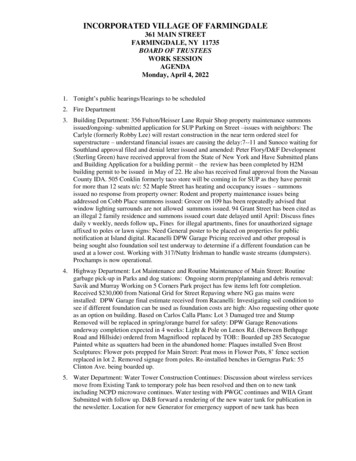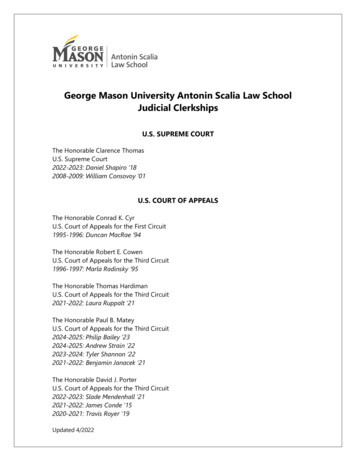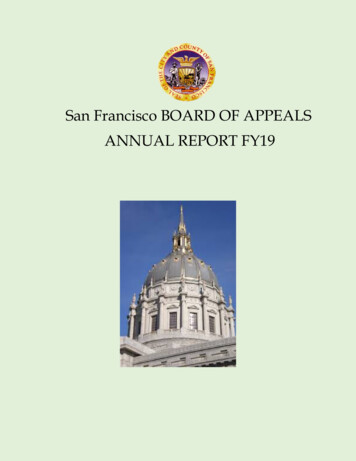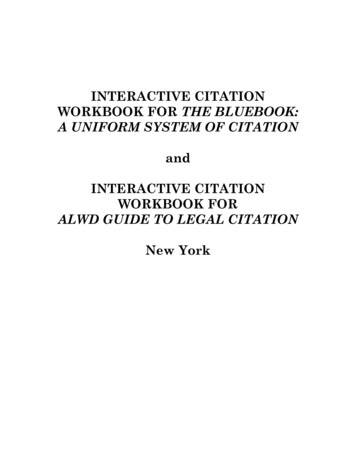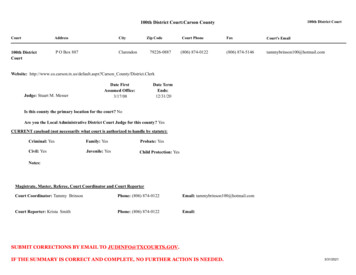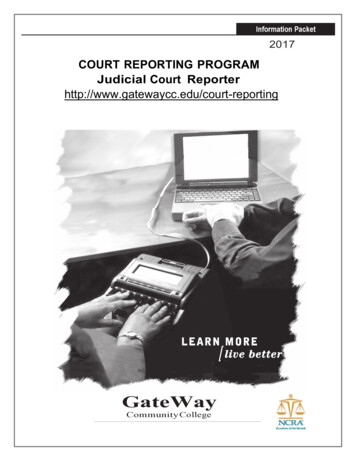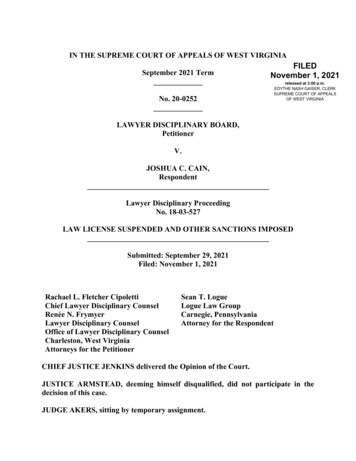
Transcription
IN THE COURT OF APPEALS FOR THE STATE OF WASHINGTONMOSES LAND GROW, LLC, aWashington Limited Liability CompanyRespondent,No. 81603-9-IDIVISION ONEUNPUBLISHED OPINIONv.BRICKSTONE HOLDINGS, LLC, aWashington Limited Liability Company;MICHAEL SCOTT FLADSETH and JANEDOE FLADSETH, husband and wife, andtheir marital community,Appellant.ANDRUS, A.C.J. — Michael Fladseth appeals a judgment entered againsthim in favor of his former joint venture partner, Moses Land Grow, LLC (MLG). Hecontends material issues of fact precluded summary judgment on MLG’s claims ofbreach of contract and misrepresentation.He also argues the trial courtmiscalculated the judgment amount. We disagree and affirm.FACTSIn March 2017, Fladseth and MLG formed Brickstone Holdings, LLC(Brickstone), a joint venture engaged in the business of purchasing and developingreal property located at 10843 1st Avenue South in Seattle. They signed an
No. 81603-9-I/2operating agreement under which Fladseth agreed to act as manager of Brickstoneand to make an initial capital contribution of “one half (1/2) of the 550,000purchase price and related costs.”Fladseth agreed to serve withoutcompensation. MLG agreed to make, as its initial capital contribution, “half (1/2)of the 550,000 purchase price and related costs by wire transfer to escrow forclosing and additional development costs thereafter.” If either member failed tomake their initial capital contribution within ten days from the effective date of theoperating agreement, the defaulting member’s interest would terminate.As manager, Fladseth was given the authority to make “all decisionsconcerning the operation and management of the Company’s business,” includingexecuting loans and encumbrances of the company and its assets. But on thesame day the parties executed the operating agreement, they also executed acorporate resolution that provided that “[a]ny single expense in excess of 20,000. . . shall be approved by a majority of the members before it is executed by themanager.”It is undisputed that MLG made its initial capital contribution of 275,000 tofund its 50 percent share of the property purchase. MLG subsequently discoveredthat Fladseth never made a cash capital contribution. Instead, in late April 2017,Fladseth, on behalf of Brickstone, obtained a loan of 297,840 from a lendernamed Eastside Funding, LLC (Eastside) and used the loan proceeds to fund hisshare of the purchase price. Fladseth also executed an “Unconditional Guarantyof Payment and Performance,” purportedly on behalf of MLG, in which hecommitted MLG to repaying the Eastside promissory note. MLG’s representative,-2-
No. 81603-9-I/3Julinda Juniarty, testified that Fladseth was never a manager, member, or agentof MLG and had no authority to execute any loan guaranty on its behalf. Fladsethdid not dispute this evidence.At the same time Fladseth signed the loan documents for the purchase ofthe property, he entered into a separate construction loan agreement withEastside, under the terms of which Eastside agreed to lend Brickstone 154,500.00 to finance its development and construction expenses. He executeda “Construction Promissory Note,” agreeing to pay off the balance of the note bySeptember 16, 2017. And Fladseth executed a “Construction Deed of Trust,Security Agreement and Fixture Filing,” pledging the property as collateral for theloan.The purchase closed on or about April 21, 2017. Juniarty testified thatbefore the sale closed, Fladseth showed her what purported to be an estimatedsettlement statement for the property and this statement did not reflect the fact thatBrickstone had taken out any loans to fund the acquisition.When MLG discovered that Fladseth had used loan proceeds to fund hisshare of the purchase price and that Fladseth had signed a guaranty in MLG’sname, Juniarty demanded that Fladseth be personally responsible for the loan. OnMay 1, 2017, Fladseth signed a document entitled “Brickstone Holdings LLCResolution re: Fladseth Loan Responsibility” (the May 1 Promissory Note) in whichhe acknowledged his personal responsibility for the loan he had taken out inBrickstone’s name. The document further provided:M. Scott Fladseth agrees that this resolution, both in concertwith the Operating Agreement and as a free standing instrument,-3-
No. 81603-9-I/4shall serve as a binding contract, agreement, and promissory notereflecting his responsibility for the 1st Street project loan as set forthabove subject to full enforcement under the Laws of the State ofWashington.In October 2017, Fladseth took out a new loan for 280,000, doing so thistime in his name personally and in the name of Brickstone, from a new lender,Kevin Downey. He executed a new promissory note and agreed to repay it withinterest at a rate of 12 percent by August 19, 2018. Fladseth also executed, onbehalf of Brickstone, a deed of trust, again pledging the property as collateral forthe loan. Fladseth used the proceeds from this loan to pay off the Eastsideconstruction loan of 154,500.There is no evidence in the record that Fladseth incurred any costs torenovate any portion of the property. According to Fladseth, he immediately beganlooking for buyers for the warehouse. He testified that Juniarty was anxious to sellthe property and wanted him to find a buyer quickly. Although Fladseth secured afew offers, each fell through.In July 2018, MLG initiated litigation against Fladseth and Brickstone,alleging that Fladseth had not made a capital contribution as required by theoperating agreement, that Fladseth had taken out loans in Brickstone’s name andencumbered the property without MLG’s knowledge or consent, and that Fladsethhad misappropriated rental income. MLG alleged claims of breach of fiduciaryduty, fraud or misrepresentation, fraudulent concealment, breach of contract, andconversion, and sought an accounting from Fladseth, an injunction removing himas manager of the company, and a dissolution of Brickstone.-4-
No. 81603-9-I/5On October 8, 2018, Fladseth executed a purchase and sale agreementwith a buyer named Todd Bell for the price of 930,000, subject to financing and a45-day feasibility study. On October 22, 2018, the court appointed a custodialreceiver to take over management of Brickstone.The receiver took overnegotiations relating to the ultimate sale to Bell. On December 14, 2018, the courtapproved the sale of the property to Bell. Although the revised purchase and saleagreement is not in the record, the excise tax affidavit shows the final purchaseprice was of 900,000.As directed by the trial court, the receiver used the proceeds of the sale topay off the debts Fladseth had caused Brickstone to incur. After paying off thecompany’s loans, the closing costs, taxes, and sales commissions, the netproceeds of the sale were 101,154.49. As required by the order authorizing thesale, the receiver deposited those proceeds with the registry of the King CountySuperior Court.MLG moved for summary judgment on two of its claims, breach of contractand misrepresentation. It sought 397,905.83 in damages from Fladseth. It alsofiled a motion to have the net sales proceeds on deposit with the court distributedto MLG to offset Fladseth’s debt.In November 2019, the trial court granted MLG’s motions, finding Fladsethliable for breach of contract and misrepresentation. It awarded MLG 397,905.83,to be offset by the amount disbursed to MLG from the remaining sale proceeds.The court subsequently awarded MLG attorney fees of 39,694, and costs of-5-
No. 81603-9-I/6 2,163.32, based on a provision in the operating agreement. It entered finaljudgment against Fladseth after MLG voluntarily withdrew all remaining claims.Fladseth appeals the judgment against him.ANALYSISFladseth argues the trial court erred in granting summary judgment becausethere are questions of fact as to whether he breached the operating agreement ormisrepresented his capital contribution and whether he caused MLG to incur anydamages. We disagree.Summary judgment is appropriate when there are no genuine issues ofmaterial fact and the moving party is entitled to judgment as a matter of law. CR56(c); Messenger v. Whitemarsh, 13 Wn. App. 2d 206, 210, 462 P.3d 861 (2020).“A genuine issue of material fact exists when reasonable minds could differ on thefacts controlling the outcome of the litigation.” Messenger, 13 Wn. App. 2d at 210(quoting Dowler v. Clover Park Sch. Dist. No. 400, 172 Wn.2d 471, 484, 258 P.3d676 (2011)).If the moving party satisfies its initial burden of showing no issues of factexist, the burden shifts to the nonmoving party to bring forth specific facts to rebutthe moving party's contentions. Elcon Constr., Inc. v. E. Wash. Univ., 174 Wn.2d157, 169, 273 P.3d 965 (2012). Although all facts and reasonable inferences mustbe interpreted in the light most favorable to the nonmoving party, Messenger, 13Wn. App. 2d at 210, “[t]he nonmoving party may not rely on speculation,argumentative assertions, ‘or in having its affidavits considered at face value; forafter the moving party submits adequate affidavits, the nonmoving party must set-6-
No. 81603-9-I/7forth specific facts that sufficiently rebut the moving party's contentions anddisclose that a genuine issue as to a material fact exists.’” Becker v. Wash. StateUniv., 165 Wn. App. 235, 245-46, 266 P.3d 893 (2011) (quoting Seven GablesCorp. v. MGM/UA Entm't Co., 106 Wn.2d 1, 13, 721 P.2d 1 (1986)).We review rulings on summary judgment de novo. Messenger, 13 Wn. App.2d at 210.Breach of ContractFladseth first argues that the trial court erred in granting summary judgmentbecause there are issues of fact as to whether he breached the operatingagreement. MLG argued below that Fladseth breached the operating agreementby failing to make a cash capital contribution within ten days of the effective dateof that agreement and he violated the expenditure resolution by taking out aconstruction loan, well in excess of the 20,000 limit, without MLG’s authorizationor consent. Fladseth contends he pledged a promissory note for his half of thepurchase price and this pledge constituted a permissible capital contribution underthe language of the operating agreement. He also maintains that he had theauthority under the operating agreement to encumber the property and thecorporate expense resolution did not limit his ability to take out loans onBrickstone’s behalf. We address each issue in turn.Fladseth’s Capital ContributionThe operating agreement required each member of Brickstone to make aninitial capital contribution of one-half of the 550,000 purchase price within tendays of the effective date of the operating agreement.-7-
No. 81603-9-I/8Fladseth concedes he contributed no cash to Brickstone or to the purchaseof the property.Instead, Fladseth argues he made a non-monetary capitalcontribution by pledging to repay the 297,840 loan he took out in Brickstone’sname. There are several problems with this argument.First, the operating agreement became effective on March 28, 2017, whenFladseth and MLG executed it. Fladseth did not execute any promissory note untilMay 1, 2017, more than 10 days after the operating agreement’s effective date. Ifthe May 1 Promissory Note was an acceptable non-monetary capital contribution,he did not make it until after the expiration of the 10-day period. Based on thisundisputed evidence, Fladseth breached paragraph 3.3 of the operatingagreement and his membership in Brickstone terminated on the day of breach.Second, paragraph 1.7 of the operating agreement defined “CapitalContribution” as:[T]he amount of money, the forgiveness of any debt, and theFair Market Value of any services or property (other than money)contributed to the Company (net of liabilities secured by suchcontributed property that the Company is considered to assume ortake “subject to” under IRC Section 752) in consideration of aPercentage Interest held by such Member. A Capital Contributionshall not be deemed a loan.“Fair Market Value” is also a defined term. The “Fair Market Value” of any propertycontributed by a member to the company “shall be the value of such property, asmutually agreed by the contributing Member and the Company.”These provisions of the operating agreement required Fladseth tocontribute either money or other “property” with an agreed-upon fair market value.There is no evidence in the record that Fladseth and Brickstone reached an-8-
No. 81603-9-I/9agreement on the value of Fladseth’s pledge to repay the Brickstone loan.Depending on Fladseth’s personal wealth (or lack thereof) and assets he ownedto back up this promissory note, its fair market value could have been zero.Fladseth contends that RCW 25.15.191 permits members to pledgepromissory notes as their capital contributions in limited liability companies. Thatstatute provides:The contribution of a member to a limited liability company mayconsist of tangible or intangible property or other benefits to thelimited liability company, including money, services performed,promissory notes, other agreements to contribute cash or property,or contracts for services to be performed.But under RCW 25.15.018(1), the limited liability company agreement governsrelations among members. Chapter 25.15 RCW only governs “[t]o the extent thelimited liability company agreement does not otherwise provide . . .” RCW25.15.018(2). Because the parties to this operating agreement expressly definedwhat the members considered to be acceptable initial capital contributions, RCW25.15.191 does not apply. While the word “property” in paragraph 1.7 of theoperating agreement could conceivably include a promissory note, because apromissory note may be a type of intangible property, In re Davis, 35 B.R. 795,799 (Bankr. W.D. Wash. 1983) (intangible property includes stocks, bonds,promissory notes and franchises), the value of any such property remained subjectto an agreement between the member and the company as to that property’s fairmarket value. No such agreement existed here.Finally, even if the parties had agreed that Fladseth could contribute apromissory note as his initial capital contribution, he presented no evidence that-9-
No. 81603-9-I/10the note had an actual value of one-half of the purchase price, as required byparagraph 3.2 of the operating agreement. Generally, when a member’s capitalcontribution is only that member’s own promissory note, the member’s capitalaccount would be 0. See 31 DALE CARLISLE & BROOKE JOHNSON, W ASHINGTONPRACTICE, W ASHINGTON BUSINESS LAW 804 cmt. to 25.15.191 (2019 ed.).IfFladseth’s promissory note had a value of 0, he cannot claim he contributed onehalf of the 550,000 purchase price.The trial court did not err in concluding that there were no genuine issuesof material fact regarding Fladseth’s breach of the operating agreement based onhis non-payment of one-half of the purchase price within ten days of the executionof that agreement.Construction Loan as Encumbrance and Not ExpenseFladseth also contends he did not breach the operating agreement by takingout loans in Brickstone’s name because he was authorized to execute loans andto encumber the property. We agree in part and disagree in part.Section 5.1 of the operating agreement provided:Except as otherwise set forth in this Agreement, all decisionsconcerning the operation and management of the Company’sbusiness shall be made by the Manager, and the decisions and theday to day operations of the Company shall be executed by theManager. This includes, but is not limited to, execution of loans andencumbrances of the Company and its assets and holdings both realand chattel, entry of contracts and agreements on behalf of theCompany and concerning its assets and holdings both real andchattel, and sale, disposition, acquisition, and any other actionrelated to current, future, or past assets and holdings of the Companyboth real and chattel.- 10 -
No. 81603-9-I/11The expense resolution, executed simultaneously, provided that “[a]ny singleexpense in excess of 20,000 . . . shall be approved by a majority of the membersbefore it is executed by the manager.” At issue is whether this “expense” restrictionapplied to the 297,840 loan Fladseth executed to effectuate the acquisition of theproperty, the 154,500 loan Fladseth executed to cover anticipated developmentcosts after the sale closed, or the 280,000 loan Fladseth executed to pay off the 154,500 loan.The parties clearly contemplated that Brickstone would incur costs toacquire the land and additional costs to develop it. The operating agreementprovided that “the LLC is engaged in the business of purchasing and developingthe land at 10843 1st Ave South in Seattle WA 98168.”But paragraph 3.2 of the operating agreement contemplated that all ofBrickstone’s acquisition costs would be covered by each member’s initial capitalcontribution. If, as Juniarty testified, MLG believed that each member would becontributing 50 percent of the cost to acquire the land, there would have been noreason to cap Fladseth’s borrowing authority for the acquisition. And there isnothing in the expense resolution that suggests the contrary. We conclude theexpense limitation resolution did not limit Fladseth’s authority to execute a loan toacquire the land. 1But the expense limitation did apply to Fladseth’s ability to incur expensesfor developing the property. Paragraph 3.2.2 of the operating agreement contains1We do not suggest that Fladseth acted appropriately by incurring this debt. He admitted that the 297,840 loan was for his personal benefit, and not the benefit of Brickstone, when he signed theMay 1 Promissory Note and took responsibility for paying off the loan.- 11 -
No. 81603-9-I/12MLG’s agreement to be responsible for covering “additional development costs”that Brickstone incurred after acquisition. It makes sense that MLG would limitFladseth’s spending authority on such development costs given MLG’scommitment to cover them.We therefore conclude the expense limitationresolution did limit Fladseth’s authority to spend money to develop this property orto borrow money to cover such expenses.There is no evidence Fladseth sought MLG’s consent for the constructionloan or for any development expenses. When Fladseth signed the constructionloan agreement with Eastside, he represented to the lender that the loan proceedswould be used to cover the cost of developing and constructing a “residentialdwelling” on the property. 2 According to Eastside’s records, it advanced 150,000to Brickstone on or about May 1, 2017. Juniarty testified that “Mr. Fladseth told[MLG] that he would provide [MLG] with an accounting for the “ʻrenovationʼ” costshe had undertaken for the Property. To date, he has never provided such anaccounting.” Fladseth did not dispute this testimony.Indeed, there is no evidence of what Fladseth did with the funds Eastsideadvanced to Brickstone. Fladseth produced a WhatsApp chat log of messages heand Juniarty exchanged between October 26, 2017 and July 26, 2019 todemonstrate that he kept her updated on his progress in trying to sell the property.But not a single message relates to expenses Fladseth wanted or needed to incurto develop the property before he could market or sell it. These messages all relateto prospective purchasers, anticipated sale dates and renting the warehouseWe assume the reference to a residential dwelling was an error given that Fladseth testified theproperty Brickstone acquired was a small commercial warehouse.2- 12 -
No. 81603-9-I/13space to tenants pending sale. There is no evidence Fladseth sought or obtainedMLG’s approval, orally or in writing, for any development costs associated with thisproperty, despite incurring liability to Eastside for 150,000 in development costs.The trial court did not err in concluding that, based on this record, there are nodisputed facts that Fladseth violated the spending limit resolution by borrowing 150,000 for development costs he never incurred.Fladseth appears to suggest that he improved the property in some way justbased on the difference between the May 2017 purchase price of 550,000 andthe December 2018 sales price of 900,000. But if Fladseth had invested moneyto improve the property, he would have been in the best position to identify theseimprovements. He provided no such evidence. And facts required to defeat amotion for summary judgement must be based on more than mere possibility orspeculation. Doe v. Dep't of Transp., 85 Wn. App. 143, 147, 931 P.2d 196 (1997).There is nothing in the record to suggest that Fladseth invested any funds in theproperty in order to enhance its value.The uncontested evidence demonstrates that Fladseth breached theoperating agreement by not making the requisite capital contribution within tendays of the execution of the operating agreement and by exceeding the expensespending limit by borrowing 154,500 for development costs and then not usingthe proceeds for these expenses. Summary judgment on the contract claim wasappropriate.- 13 -
No. 81603-9-I/14Negligent MisrepresentationFladseth next argues the trial court erred when it found him liable formisrepresentation because (1) he did not misrepresent his capital contribution toMLG; (2) MLG did not rely on any such misrepresentation; and (3) MLG was notdamaged by any misrepresentation.To establish negligent misrepresentation, MLG must show:(1) the defendant supplied information for the guidance of others intheir business transactions that was false, (2) the defendant knew orshould have known that the information was supplied to guide theplaintiff in [their] business transactions, (3) the defendant wasnegligent in obtaining or communicating the false information, (4) theplaintiff relied on the false information, (5) the plaintiff's reliance wasreasonable, and (6) the false information proximately caused theplaintiff damages.Merriman v. Am. Guar. & Liab. Ins. Co., 198 Wn. App. 594, 613, 396 P.3d 351(2017) (quoting Ross v. Kirner, 162 Wn.2d 493, 499, 172 P.3d 701 (2007).MLG contended that Fladseth committed misrepresentation by failing todisclose that he had not contributed cash as his initial capital contribution and hadinstead taken out a loan in Brickstone’s name to purchase the property. Juniartytestified she did not know, before closing on the property, that Fladseth had failedto make a cash capital contribution. Fladseth did not dispute this testimony.Juniarty also testified that, prior to closing the purchase, Fladseth showed her anestimated settlement statement that did not include the loan he had taken out tofinance the acquisition. Fladseth did not dispute this evidence. Juniarty testifiedFladseth took out these loans without MLG’s knowledge and consent. Again,Fladseth did not dispute this evidence.- 14 -
No. n,byitself,Ross, 162 Wn.2d at 499.cannotconstitutenegligentBut a party may be liable fornegligent misrepresentation for an omission if he has a duty to disclose, which canarise in a business transaction if imposed by a fiduciary relationship or other similarrelationship of trust or confidence. Van Dinter v. Orr, 157 Wn.2d 329, 333-34, 138P.3d 608 (2006).Under Washington’s Limited Liability Company Act, in amanager-managed LLC, the manager owes a fiduciary duty to the LLC and itsmembers. Dragt v. Dragt/DeTray, LLC, 139 Wn. App. 560, 575, 161 P.3d 473(2007); Dickens v. Alliance Analytical Laboratories, LLC, 127 Wn. App. 433, 440,111 P.3d 889 (2005).Fladseth, as Brickstone’s manager, owed a fiduciary duty to both Brickstoneand MLG not to supply false information to them. Here, Fladseth did not disclosethe existence of the Eastside loans, one of which Fladseth had obtained by signinga forged guarantee on behalf of MLG. This evidence was sufficient to provenegligent misrepresentation.The undisputed evidence also proves that MLG reasonably relied onFladseth’s misrepresentation. Juniarty testified that, had she known that Fladsethhad not made his capital contribution, MLG would have either rescinded its owncapital contribution or withdrawn from the purchase of the property.Fladseth argues that MLG could not have relied on this misrepresentationbecause it knew of the loans. To support this, Fladseth points to the May 1Promissory Note and to the WhatsApp messages. But neither proves that Juniartyknew about the loans before the purchase closed on April 21.- 15 -The May 1
No. 81603-9-I/16Promissory Note came a week after closing. The WhatsApp messages occurredmonths after closing as well. The fact that Juniarty knew of the loans in May 2017does not contradict her testimony that MLG reasonably relied on Fladseth’smisrepresentations in April 2017 when it made its capital contribution and allowedthe sale to close.Finally, the undisputed evidence establishes that MLG was damaged byFladseth’s misrepresentations. But for the misrepresentation, MLG would haveretained the 275,000 it contributed to Brickstone. The trial court properly foundFladseth liable for misrepresentation.DamagesFinally, Fladseth contends there are genuine issues of material factregarding MLG’s claimed damages.“Generally, the measure of damages for breach of contract is that theinjured party is entitled to recovery of all damages naturally accruing from thebreach, and to be put in as good a position as he would have been in had thecontract been performed.” Nw. Land & Inv., Inc. v. New W. Fed. Sav. & LoanAss'n, 57 Wn. App. 32, 43, 786 P.2d 324 (1990). Damages recoverable fornegligent misrepresentation are limited to those necessary to compensate theplaintiff for the pecuniary loss to him caused by the misrepresentation. Janda v.Brier Realty, 97 Wn. App. 45, 50, 984 P.2d 412 (1999) (quoting RESTATEMENT(SECOND) OF TORTS § 552B (AM. LAW INST. 1977)). This includes “pecuniary losssuffered otherwise as a consequence of the plaintiff's reliance upon themisrepresentation.” Id.- 16 -
No. 81603-9-I/17The trial court awarded MLG 397,905 in damages. The court calculatedthis amount by taking the total sale price of 900,000, subtracting 104,188.33 inclosing costs, unpaid real estate taxes, and sale commissions, for net salesproceeds of 795,811.67.Had Fladseth not encumbered the property withpersonal loans, or with construction loans, the proceeds of which appear to havevanished, this sum would have been Brickstone’s profit. Under the operatingagreement, MLG was entitled to 50 percent of that amount, or 397,905.83. Thetrial court correctly concluded that this amount is what MLG would have receivedfrom the sale of the property but for Fladseth’s misrepresentation and breach ofthe operating agreement.Fladseth argues that these damages were miscalculated because there aregenuine issues of fact whether MLG’s actions contributed to its damages. Fladsethcontends MLG intervened in the management of the property, causing Brickstoneto default on its loan obligations. He argues that the costs associated with theseloan defaults should be attributable to MLG. But Fladseth agreed to be personallyliable for the Eastside loan of 297,840. Any default on this loan was not MLG’slegal responsibility; it was his. We do not have any of the receivership pleadingsin the record before us, as Fladseth has not challenged the order appointing areceiver. But the receivership statute allows the appointment of a receiver in verylimited circumstances, including when a company is insolvent and unable to meetits debts. There is no evidence in this record to suggest MLG was responsible forthe Brickstone’s financial condition warranting the appointment of a receiver.- 17 -
No. 81603-9-I/18Fladseth next contends MLG’s counsel began collecting rents from thetenants of the property starting in July 2018, leading to what he identified as“penalty interest on various loans.” But we have no further details other than thisvague, uncorroborated statement. It is insufficient to create a genuine issue ofmaterial fact.Finally, Fladseth asserts that MLG is somehow responsible for the propertybeing sold for 900,000 rather than the 930,000 price he negotiated before theappointment of the receiver. Again, this accusation is not substantiated by anyevidence. The sale agreement Fladseth negotiated before the receiver took overwas subject to both a financing contingency and a feasibility contingency. We canonly speculate as to what negotiations occurred to lift either of these contingencies.And the trial court’s calculation of MLG’s damages accounted for this decreasedreturn by basing MLG’s award on the lower sale price.Fladseth failed to present evidence to create a genuine issue of materialfact as to the amount of MLG’s damages. Summary judgment for MLG was thusappropriate.B. Attorney Fees on AppealBoth Fladseth and MLG request attorney fees on appeal.A party may request an award of attorney fees and costs if the applicablelaw provides the right to recover fees and costs on appeal. RAP 18.1(a). Here,the operating agreement provides that if either member fails to make their requiredcapital contributions within ten days of the agreement’s effective date, that membershall indemnify the other member from any “loss, cost, or expense, including- 18 -
No. 81603-9-I/19reasonable attorney fees incurred, caused by the failure to make such CapitalContribution.”MLG prevailed on its claim that Fladseth failed to make his capitalcontribution and was awarded attorney fees below. Because MLG is the prevailingparty on appeal, we award it reasonable attorney fees incurred on appeal, subjectto compliance with RAP 18.1.We affirm.WE CONCUR:- 19 -
that Fladseth never made a cash capital contribution. Instead, in late April 2017, Fladseth, on behalf of Brickstone, obtained a loan of 297,840 from a lender named Eastside Funding, LLC (Eastside) and used theloan proceeds to fund his share of the purchaseprice . Fladseth also executed an "Unconditional Guaranty



